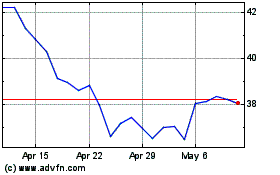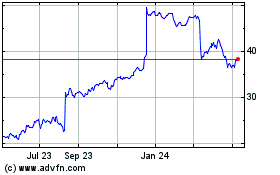Uncertainty Over Nafta Makes Market Worry More Acute
June 17 2018 - 10:29AM
Dow Jones News
By Ira Iosebashvili and Akane Otani
Escalating trade tensions are rattling markets as a new round of
tariffs raises investors' concerns about everything from U.S.-China
relations to the fate of the North American Free Trade
Agreement.
The mounting strains left investors struggling to understand the
sweeping ramifications of those conflicts, including their impact
on economies, interest rates, inflation and stock valuations.
President Donald Trump approved tariffs on about $50 billion of
Chinese goods Friday, prompting Chinese officials to hit back with
tariffs of their own.
The moves, which investors said exacerbated fears that the
world's two biggest economies could descend into a full trade war,
buffeted government bond yields and shares of agricultural and
industrial companies that could suffer under tighter trade
policies. Caterpillar Inc. slid 2%, while farm-machinery maker
Deere & Co. lost 1%, Boeing Co. fell 1.3% and United States
Steel Corporation declined 4.2%. Declines in industrial
heavyweights pulled the Dow Jones Industrial Average to its biggest
one-week slide since March.
Now, investors are debating whether financial markets that had
already been struggling for momentum this year will be able to
shake off an increasingly uncertain outlook for global trade and
growth.
While the U.S. economy continues to exhibit signs of strength,
investors and analysts say they are concerned about the rise of
restrictive trade policies because so much activity depends on
cross-border transactions. The feud over Nafta poses a particularly
acute manifestation of those fears. Mr. Trump, who has threatened
to withdraw entirely from the accord, removed the U.S. from the
Trans-Pacific Partnership as one of his first official acts in
office.
The move "would be a strong signal to the global community that
the U.S. is really embracing the America-first agenda," said Mark
McCormick, North American head of FX strategy at TD Securities.
"That's probably bad for globalization, bad for equities, bad for
risk."
Any signs that the deal might be replaced with bilateral
agreements between the U.S., Canada and Mexico would likely soothe
investors and take the edges off market moves, analysts said. On
the other hand, emerging-market currencies, commodities prices and
Mexican and Canadian assets could slide if it appeared that the
Nafta conflict was the prelude to an all-out global trade war.
Many investors and analysts fear that a U.S. withdrawal from
Nafta could further hamper a U.S. stock market that has struggled
to gain ground this year, denting profits for companies that
produce and export automobiles, agricultural goods -- including
corn, soybean and beef -- and industrial machinery.
Through Nafta, U.S. car manufacturers like Ford Motor Co. and
General Motors Co. have been able to shift production to Mexico,
where wages are typically lower. Some economists argue that without
access to lower-cost production hubs, the U.S. auto industry could
lose ground to competitors in Asia. The disruptions could also
cause foreign car makers to rethink their investments in U.S.
production facilities.
"These sort of linkages, which have given U.S. auto makers an
advantage in relation to China, would be much more difficult
without NAFTA's tariff reductions and protections for intellectual
property," a 2017 analysis by the Council on Foreign Relations
said.
Shares of agricultural and industrial firms could also take a
hit. The U.S. exported $43 billion worth of prepared food,
vegetables, fruit and other food and beverages and $85 billion
worth of machinery to Canada and Mexico last year, according to
federal data. Withdrawal from Nafta could squeeze profit margins at
companies like Constellation Brands Inc., which brews Corona and
Modelo beer in Mexico, as well as agricultural giants like Archer
Daniels Midland Co.
More broadly, some fear a U.S. exit from Nafta could trigger
tit-for-tat trade measures that weigh on an even wider range of
industries.
"Even if it ended up being replaced with something better for
the U.S., that would take time, which adds to uncertainty among
investors," said Karyn Cavanaugh, senior market strategist at Voya
Investment Management, who added that she would expect an immediate
pullback across the stock market.
Uncertainty over Nafta has already taken a toll on Mexican and
Canadian markets. Stocks in both countries have stagnated this
year, along with the S&P 500, which remains below its all-time
high hit January. The Mexican peso is down 4.7% against the dollar
this year, while Canada's currency has fallen 4.6%.
Alan Robinson, global portfolio adviser at RBC Wealth
Management, said his firm now sees a 25% chance that Nafta
negotiations will fail, up from 10% earlier in the year. Analysts
at Toronto-based Gluskin Sheff + Associates believe there is a 40%
chance the deal will fall apart and be replaced with bilateral
agreements.
"Do we assume cooler heads prevail? You try to be optimistic,
but we're talking about human beings here and human beings make
mistakes," said David Rosenberg, chief economist and strategist at
Gluskin Sheff.
(END) Dow Jones Newswires
June 17, 2018 10:14 ET (14:14 GMT)
Copyright (c) 2018 Dow Jones & Company, Inc.
US Steel (NYSE:X)
Historical Stock Chart
From Mar 2024 to Apr 2024

US Steel (NYSE:X)
Historical Stock Chart
From Apr 2023 to Apr 2024
